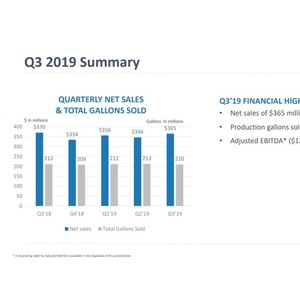Pacific Ethanol to idle more than 60% of capacity by end of March

March 27, 2020
BY Erin Krueger
Pacific Ethanol Inc. on March 27 said it is idling capacity in response to the unprecedented decline in gasoline and ethanol demand due to the impacts of the coronavirus and announced it is providing high-quality alcohol for the production of hand sanitizers.
Pacific Ethanol made the announcements during an earnings call held to discuss the company’s fourth quarter financial results.
Neil Koehler, president and CEO of Pacific Ethanol, said statewide stay-at-home orders ordered to help slow the spread of COVID-19 have dramatically reduced fuel demand. “In all our markets, we have seen significant reductions in ethanol sales to our customers,” he said, noting the company expects to see fuel demand fall by up to 50 percent or more in some markets during the pendency of stay-at-home orders.
Advertisement
As a result of COVID-19 and other factors, Koehler said ethanol plant production margins across the country are negative. “The pandemic is compounding the adversity of an already oversupplied ethanol market,” he said. “As a result, the industry as a whole is shutting down production to reduce supply and avoid negative cash flow operations. Pacific Ethanol is idling plants during this period and expects to have reduced production by over 60 percent by the end of March. Every plant has customer and commitments to meet fuel and food demand, so shutting down production needs to occur in an orderly manner with the objective of meeting our contractual commitments while minimizing negative cash impacts.”
In response to the coronavirus, Koehler said Pacific Ethanol’s Pekin, Illinois, ICP facility is producing and shipping record amounts of high-quality alcohol for use in hand sanitizers. The plant produces high-quality alcohol that is sold into industrial, chemical and beverage grade markets. Sales into the hand sanitizer market have historically accounted for 10 percent of total ICP production, Koehler said. “With the now increased demand for the product, we are modifying production processes and have more than doubled our sales into this application and are working diligently to do more to meet this critical need for high-quality alcohol,” he added. “We are also working with local health organizations and first responders in Pekin to produce and donate hand sanitizer in that community to frontline health workers who are attending to those impacted by the coronavirus. This is a time when we all need to work together to help stop this pandemic.”
Regarding Pacific Ethanol’s strategic initiatives, Koehler said the company has engaged Chief Restructuring Officer Winston Mar on a consulting basis. He will assist the company in negotiating with lenders and implementing strategic initiatives.
Koehler also provided an update on the company’s March 3 announcement that it will sell its 74 percent ownership interest in Pacific Aurora LLC to the Aurora Cooperative Elevator Co. “We are working diligently to close this transaction as soon as possible,” Koehler said, adding that the company is in discussions with multiple parties regarding the sale or strategic partnerships for various other assets. “We are actively working on these transactions,” he said.
Advertisement
“These are challenging times for our country and for our company. Even so, given the continued compelling cost, octane and carbon benefits of ethanol, we firmly believe in the industry’s long-term growth prospects. We are working constructively with our lenders, customers and suppliers to put the company in the best position to thrive in the future,” Koehler said.
Pacific Ethanol reported net sales of $357.6 million for the fourth quarter, compared to $334.4 million during the same period of 2018. Total gallons sold fell to 195.5 million, down from 209.4 million during the fourth quarter of the previous year. Gross profit was $3.2 million, compared to a gross loss of $21 million. Loss available to common stockholders was $41.4 million, or 85 cents per share, compared to $32.3 million or 74 cents per share. Adjusted EBITDA was positive $1.9 million compared to negative $18 million.
For the full year 2019, Pacific Ethanol reported net sales of $1.42 billion, down from $1.52 billion. Gross loss for 2019 was $9.9 million compared to a gross loss of $15.2 billion in 2018. Loss available to common stockholders was $90.2 million, or $1.90 per share, compared to $61.5 million, or $1.42 per share, in 2018. Adjusted EBITDA was negative $1.7 million, compared to negative $5.1 million.
Related Stories
U.S. fuel ethanol capacity fell slightly in April, while biodiesel and renewable diesel capacity held steady, according to data released by the U.S. EIA on June 30. Feedstock consumption was down when compared to the previous month.
XCF Global Inc. on July 8 provided a production update on its flagship New Rise Reno facility, underscoring that the plant has successfully produced SAF, renewable diesel, and renewable naphtha during its initial ramp-up.
The USDA’s Risk Management Agency is implementing multiple changes to the Camelina pilot insurance program for the 2026 and succeeding crop years. The changes will expand coverage options and provide greater flexibility for producers.
EcoCeres Inc. has signed a multi-year agreement to supply British Airways with sustainable aviation fuel (SAF). The fuel will be produced from 100% waste-based biomass feedstock, such as used cooking oil (UCO).
SAF Magazine and the Commercial Aviation Alternative Fuels Initiative announced the preliminary agenda for the North American SAF Conference and Expo, being held Sept. 22-24 at the Minneapolis Convention Center in Minneapolis, Minnesota.
Upcoming Events










